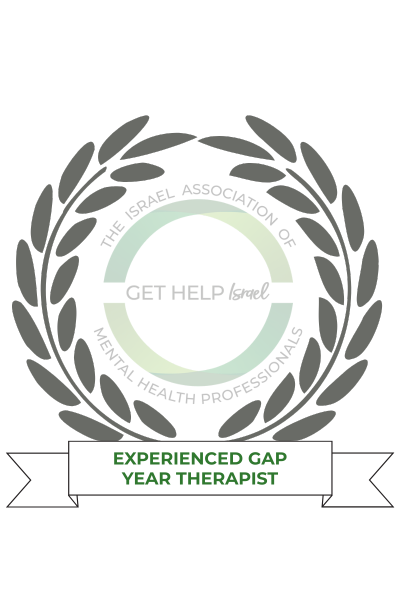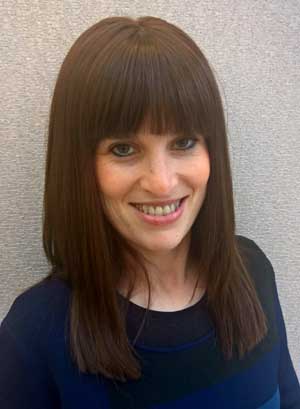Nechoma Schwab
Credentials
Finances
- Nachal Zeilim 12/3
- Ramat Beit Shemesh
Nechoma Schwab
 Verified
Verified
Credentials
Psychotherapist
PG Dip
Finances
500-700 NIS
N/A
Sliding Scale | Free Consultation | Student Discount
ABOUT THE THERAPIST
A gentle approach to trauma recovery. Helping you reclaim your voice and move from existing to living. Finding your way to ‘say what you feel & feel what you say’.
Often our bodies hold unresolved conflicts, talking doesn't always help us to reach a place of healing. We know with our minds, but our bodies may feel out of sync. I offer an embodied therapeutic approach built on the understanding that our emotional, mental and physical experience are always inter-dependent.
My theoretical framework is Trauma informed, Biodynamic, Relational, Attachment based, Humanistic and Integrative.
Adolescents:
I work with adolescents both in and out of educational settings to deal with social anxiety, identity issues, body image challenges, relationships, adjustment concerns, neurodiversity – ASD, ADHD, and learning difficulties.
Adults:
I work with adults with developmental and relational trauma, PTSD, relationship and intimacy issues, primary fertility, secondary fertility, birth trauma, stillbirth, miscarriages, pregnancy after loss.
Couples:
I work with couples as they navigate their relationship together, working on their marital and intimacy issues, on fertility issues, intimacy after loss, and on precious pregnancies.
Older adults:
‘Thinking is linking’. I work with older adults in cognitive decline supporting them to experience pleasure, connection and whole-body stimulation to ensure they keep their strengths and inner resources for as long as possible.
I offer a safe, non-judgmental, open and honest space for clients to express themselves and explore what will support them as they journey towards their healing and recovery. Therapy is an opportunity for clients to reflect upon how they connect with themselves and connect with others. Sometimes it is not easy to find words, I listen to both what my clients say and what they leave unspoken. Though we enter therapy because we feel stuck, it is my firm belief that each of us knows what is best for us, we just sometimes need outside support with this. Therapy is an opportunity to help us move past our stuck places and access and actualise our potential.
I have a comprehensive background in Well-Woman personal training and physical therapy. I have worked extensively with pre- and post-natal health and fitness issues including pelvic floor rehabilitation and diastasis recti repair.
I am a Metacognitive specialist with over 10 years’ experience working in and supporting a variety of Secondary school settings in London. I have broad experience working with neurodiverse young adults and offers support to parents to help them understand and come to terms with their children’s unique strengths and challenges.
QUALIFICATIONS
PG Dip
London School of Biodynamic Psychotherapy (LSBP)
2022
Degree
PG DipEducation
London School of Biodynamic Psychotherapy (LSBP)Year of Graduation
2022Years in Practice
4
ADDITIONAL CREDENTIALS
2023 EDMR Part 1
2021 Cognitive Abilities Profile (CAP) Assessment London, UK
UKCP-registered clinical training in Biodynamic Body Psychotherapy
2018 Certificate in Biodynamic Psychotherapeutic Massage - LSBP-London School of Biodynamic Psychotherapy
2016 Instrumental Enrichment Mediator Certificate - The Feuerstein Institute, UK
2015 Instrumental Enrichment Basic (younger learners) Mediator Cert - The Feuerstein Institute, UK
2014 Instrumental Enrichment Standard (teen and adult learners) Mediator Certificate - The Feuerstein Institute, UK
2012-2014 ILM Level 5 certificate in Coaching & Mentoring
EMDR part 2 - EMDRIA - 2023
EMDR part 3 - EMDRIA - 2024
DISTANCE COUNSELING
Telephone Counseling, Online Therapy
PRIMARY SPECIALTIES
Academic
Infertility
Learning Disabilities
Sexual Issues
Trauma / Post Traumatic Stress Disorder PTSD
ADDITIONAL SPECIALTIES
Alzheimers / Dementia
Anxiety / Panic
Attention Deficit Hyperactivity Disorder (ADHD)
Autism Spectrum
Cancer / Terminal Illness
Couples / Relationship / Marriage Counseling
Developmental Disorders
Holistic
Life Transitions
Postpartum Depression
Psychosomatic Disorders
Body Image issues
CLIENT FOCUS
Population
Adolescents
Adults
Couples
Women
Languages Spoken
English
TREATMENT APPROACH
Body PsychotherapyBody psychotherapy is an integrative psychotherapy approach that combines psychodynamic, humanistic, and somatic approaches with the goal of treating psychological and physical distress. It emphasizes the connection between body and mind, and works to increase awareness of physical sensations and emotions. Body psychotherapy practitioners may use a variety of techniques, including mindfulness, body postures, breath work, relaxation, and sensory awareness, to help clients become more aware of their bodies and to learn how to use this awareness to improve their overall wellbeing.
Body-Mind PsychotherapyBody-mind psychotherapy is an integrative approach to psychological treatment that draws from both psychotherapeutic and somatic/body-based approaches. It emphasizes the interconnection between physical, emotional, cognitive and spiritual aspects of being. This approach seeks to help individuals explore how physical sensations, emotions, thoughts and beliefs influence their behavior and well-being. Through this exploration, individuals can gain insight into how the body and mind interact to create patterns of behavior, and how those patterns can be changed to promote healing and wellness.
Brainspotting (BSP)Brainspotting is a form of psychotherapy that uses eye positioning and body-based approaches to help people identify, process, and release emotional and physical distress. It is based on the idea that the body and mind are interconnected and that certain eye positions can help access and release stuck, unresolved emotions. Practitioners help clients reprocess negative events and retrain emotional reactions by guiding clients’ eyes, with a pointer, across their field of vision to find “brainspots”. Brainspots are eye positions that activate a painful emotion or trauma. Through the use of bilateral sound and/or vibration, the therapist helps the client to access and process difficult or traumatic memories and emotions, leading to lasting and positive changes in behavior and well-being.
Eye Movement Desensitization and Reprocessing Therapy (EMDR)Eye Movement Desensitization and Reprocessing (EMDR) is a psychotherapy treatment that was originally designed to alleviate the distress associated with traumatic memories. It uses a structured approach to address the past events that may be causing current distress, and uses bilateral stimulation, such as eye movements, to activate different neural networks in the brain in order to reduce symptoms of trauma. EMDR has been found to be effective for a wide range of mental health issues, including anxiety, depression, and PTSD.
Holistic PsychotherapyHolistic psychotherapy emphasizes the individual's interconnectedness between the individual's physical, mental, emotional, and spiritual aspects and views them as inseparable components of a single holistic system. Holistic psychotherapy focuses on understanding how these components interact and affect a person’s wellbeing. The goal of holistic psychotherapy is to create a sense of wholeness and harmony within the individual, and to foster self-awareness and self-care. Holistic practitioners use a variety of approaches, including traditional talk therapy, mindfulness practices, and body-based therapies like movement therapy. They also may incorporate nutrition, physical activity, and other lifestyle factors into treatment plans.
Person-Centered Therapy (Rogerian Therapy)Person-centered therapy, or Rogerian therapy, was developed by Carl Rogers in the 1940’s. It is a form of talk therapy that emphasizes the importance of providing psychological safety, unconditional positive regard, and empathic understanding to clients. This type of therapy is based on the belief that individuals have an innate capacity for self-actualization and self-understanding and that the therapist's role is to provide a supportive environment in which this process can take place. Through the use of active listening, open-ended questions, and non-judgmental reflection, the therapist helps the client to explore their thoughts, feelings, and experiences in a safe and accepting environment. By doing so, clients are able to gain insight into their issues, develop a greater understanding of themselves, and work towards personal growth.
Somatic Experiencing (SE)Somatic Experiencing (SE) is a body-oriented approach to the healing of trauma and other physical and psychological stresses. It is based on the idea that the body is a powerful source of healing and that unresolved trauma can be resolved through the process of bringing awareness and attention to the physical sensations of the body. By gradually and gently guiding individuals through the sensations associated with their traumatic experience, SE can help to restore balance and well-being more quickly and effectively than traditional psychotherapy. SE utilizes the body’s natural ability to regulate and heal itself and supports individuals in developing more resilience and self-regulation. Somatic Experiencing aims to help people move past the place where they might be “stuck” in processing a traumatic event. SE is often used to treat symptoms of post-traumatic stress disorder (PTSD), anxiety, depression, and other mental health issues.
Feuerstein method
SERVICES OFFERED
Individual Therapy
Couples Therapy
Consultation
Workshops/Educating
Home-based Therapy

Therapist's Experience with Gap Year Students
Students' ways of thinking and learning are bound with their relational experience and are reciprocal. Emotions and behaviours affecting learning are symptomatic of how the student views him/herself globally. Their time in Israel is an opportunity for them to explore their reality and decide how they can best self-actualise.

 Verified
Verified

